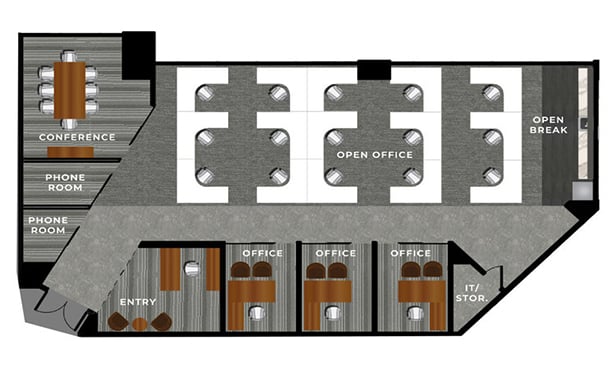SECAUCUS, NJ—Hudson County Schools of Technology has partnered with RSC Architects to create the new High Tech High School under construction in Secaucus, NJ. The $143 million, 341,000-square-foot school—which will replace an aging, undersized North Bergen campus—will house nearly 2,000 students in more than 70 classrooms with specialized instruction and experience rooms. The new High Tech High School is expected to be open in time for the fall 2018 school year.
The magnet school—which serves grades 9-12 in the Hudson County School District—will combine technically-focused, hands-on learning with a challenging academic curriculum. The design highlights a more progressive approach to education and instruction with advanced facilities, including a fabrication lab to help students explore spatial ideas through model building, a 120-seat black box theater, 360-seat performing arts auditorium, and a TV production studio with a functioning control room. Eighty-inch interactive monitors will assist teachers during lessons to replace and enhance the previously utilized standard chalkboard learning.
“Education trends are leaning towards more project-based learning to teach students 'real world' lessons, as opposed to sitting behind desks in a classroom,” says John P. Capazzi, president of RSC Architects. “The new High Tech High School will be a model for other districts seeking to be more progressive with their curriculums and preparedness of students for real-life success.”
Looking toward an environmentally-friendly future, RSC designed the facility to be one of the nation's first schools to meet LEED Platinum standards and requirements for sustainability. The school will also feature a hydroponic rooftop garden for students to grow their own food to be used in the culinary kitchen lab.
“We are looking to set a new standard for future educational facilities with this school,” says Jeff Schlecht, AIA, senior project manager for RSC Architects. “Our eco-friendly design utilizes geothermal heating and includes wind turbines that will also be used as a teaching tool within the school's curriculum.”
The school is designed to reduce the amount of greenhouse gases emitted, and minimizes wastewater by utilizing water-efficient landscaping, low-volume flush toilets and waterless urinals.
“Wayfinding and identification of the spaces was going to be an important factor in the success of the design,” Schlecht tells GlobeSt.com. “We organized the school's academies centered on the shared activity spaces similar to the buildings of a college campus. The skylight atrium is the central quad that organizes the layout of the school. The day lighted space would be significantly identifiable and would orient the students as they moved between classes. The entrance to each academy will be situated along a main corridor, identified by the brand representing the category of study.”
Schlecht says the core of the project' success was “a clearly defined vision for the school with identifiable goals and objectives.”
“The program of the spaces and the function requirements were reviewed and coordinated with the end users throughout the design of the schools,” Schlecht says. “A team of expert consultants was created to ensure that the specific requirements for each space was incorporated in the design of the project.”
RSC was retained by the Hudson County Schools of Technology to craft the bridging documents detailing the overview of the school's floor plans, dimensions and layout.
“The newly implemented design-build process will save the district millions of dollars in design and construction costs,” says Frank Garguilo, superintendent of Hudson County Schools of Technology. “The money saved will be redirected to expand the educational opportunities available to our students. RSC's high performance, environmentally sustainable design truly enhances our community.”
The new high school will be divided into four different career academies: the School of Culinary Arts, the School of Architecture & Engineering, the School of Applied Sciences and the School of Performing Arts. Each school will be housed in its own independent building space designed to fit the unique needs of its students.
The school is currently being built by Terminal Construction at Laurel Hill Park located on Laurel Hill Road in Secaucus, NJ.
CORRECTION, 6/27/2017, 10:42 a.m.: Because of an editing error, an earlier version of this story carried an incorrect headline indicating the school was in Bergen County. The school is in Hudson County, as indicated in the story.
SECAUCUS, NJ—Hudson County Schools of Technology has partnered with RSC Architects to create the new High Tech High School under construction in Secaucus, NJ. The $143 million, 341,000-square-foot school—which will replace an aging, undersized North Bergen campus—will house nearly 2,000 students in more than 70 classrooms with specialized instruction and experience rooms. The new High Tech High School is expected to be open in time for the fall 2018 school year.
The magnet school—which serves grades 9-12 in the Hudson County School District—will combine technically-focused, hands-on learning with a challenging academic curriculum. The design highlights a more progressive approach to education and instruction with advanced facilities, including a fabrication lab to help students explore spatial ideas through model building, a 120-seat black box theater, 360-seat performing arts auditorium, and a TV production studio with a functioning control room. Eighty-inch interactive monitors will assist teachers during lessons to replace and enhance the previously utilized standard chalkboard learning.
“Education trends are leaning towards more project-based learning to teach students 'real world' lessons, as opposed to sitting behind desks in a classroom,” says John P. Capazzi, president of RSC Architects. “The new High Tech High School will be a model for other districts seeking to be more progressive with their curriculums and preparedness of students for real-life success.”
Looking toward an environmentally-friendly future, RSC designed the facility to be one of the nation's first schools to meet LEED Platinum standards and requirements for sustainability. The school will also feature a hydroponic rooftop garden for students to grow their own food to be used in the culinary kitchen lab.
“We are looking to set a new standard for future educational facilities with this school,” says Jeff Schlecht, AIA, senior project manager for RSC Architects. “Our eco-friendly design utilizes geothermal heating and includes wind turbines that will also be used as a teaching tool within the school's curriculum.”
The school is designed to reduce the amount of greenhouse gases emitted, and minimizes wastewater by utilizing water-efficient landscaping, low-volume flush toilets and waterless urinals.
“Wayfinding and identification of the spaces was going to be an important factor in the success of the design,” Schlecht tells GlobeSt.com. “We organized the school's academies centered on the shared activity spaces similar to the buildings of a college campus. The skylight atrium is the central quad that organizes the layout of the school. The day lighted space would be significantly identifiable and would orient the students as they moved between classes. The entrance to each academy will be situated along a main corridor, identified by the brand representing the category of study.”
Schlecht says the core of the project' success was “a clearly defined vision for the school with identifiable goals and objectives.”
“The program of the spaces and the function requirements were reviewed and coordinated with the end users throughout the design of the schools,” Schlecht says. “A team of expert consultants was created to ensure that the specific requirements for each space was incorporated in the design of the project.”
RSC was retained by the Hudson County Schools of Technology to craft the bridging documents detailing the overview of the school's floor plans, dimensions and layout.
“The newly implemented design-build process will save the district millions of dollars in design and construction costs,” says Frank Garguilo, superintendent of Hudson County Schools of Technology. “The money saved will be redirected to expand the educational opportunities available to our students. RSC's high performance, environmentally sustainable design truly enhances our community.”
The new high school will be divided into four different career academies: the School of Culinary Arts, the School of Architecture & Engineering, the School of Applied Sciences and the School of Performing Arts. Each school will be housed in its own independent building space designed to fit the unique needs of its students.
The school is currently being built by Terminal Construction at Laurel Hill Park located on Laurel Hill Road in Secaucus, NJ.
CORRECTION, 6/27/2017, 10:42 a.m.: Because of an editing error, an earlier version of this story carried an incorrect headline indicating the school was in Bergen County. The school is in Hudson County, as indicated in the story.
Want to continue reading?
Become a Free ALM Digital Reader.
Once you are an ALM Digital Member, you’ll receive:
- Breaking commercial real estate news and analysis, on-site and via our newsletters and custom alerts
- Educational webcasts, white papers, and ebooks from industry thought leaders
- Critical coverage of the property casualty insurance and financial advisory markets on our other ALM sites, PropertyCasualty360 and ThinkAdvisor
Already have an account? Sign In Now
*May exclude premium content© 2024 ALM Global, LLC, All Rights Reserved. Request academic re-use from www.copyright.com. All other uses, submit a request to [email protected]. For more information visit Asset & Logo Licensing.









